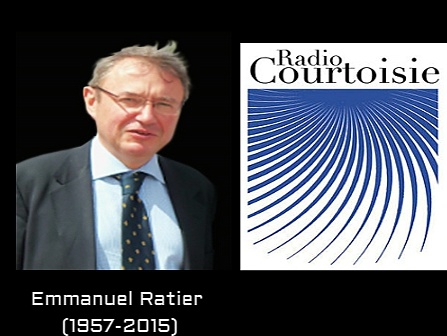French version here [2]
They say no man is a prophet in his own land.
Emmanuel Ratier was unknown in the English-speaking world. The English version of Wikipedia has no page about him. In France, the country he was born in and always had at heart, Ratier was barely known in the mainstream. Only recently had he started to become well-known, thanks to a biography he wrote about the current Prime Minister, Manuel Valls.
Densely packed with information, Le vrai visage de Manuel Valls [3] (The true face of Manuel Valls) shows how, as an eighteen-year-old, the future politician concluded an alliance with two other ambitious young men (who hold today positions of responsibility). It also unveils, with clear evidence, how the career-oriented Valls abandoned a two-decade long support to the Palestinian cause in favor of Zionism, a mandatory move for climbing the social ladder. Ratier’s biography has been a best-seller on Amazon France. Indeed, it sold more than Valls’ own autobiography, even before any official media was allowed to cover the book.
Ratier was no prophet. As far as I know, he barely went in for predicting the future. However, he was what may be called an initiated man. Over the years, he became very well informed and managed to become a top investigative reporter.
In such a situation, Ratier could have been a Machiavellian. He could have betrayed his youthful nationalist engagement, from back in the 1970s, in order to take a comfortable place inside the conservative Right. Former nationalists had already done so. But instead, Emmanuel Ratier devoted himself to the truth. He did not fall for a career inside the system, money, or social status – he chose the truth.
Though the general public was not acquainted with him until recently, his work had been noticed in the initiated environments well beyond the Right. In 1996, he launched Faits et documents [4] (Facts and documents), a twelve-page newsletter published every two weeks. Aiming at a confidential audience, Faits et documents featured profiles of important personalities, some of them famous and some more discreet, as well as copious information on what was happening inside freemasonry and other power networks.
Faits et documents was remarkable for the high density of information its few pages encapsulated. I have never seen so many valuable items in any official media outlet. The letter was presented as “confidential,” yet it could be accessed by anyone: if you wanted to have a look, you just had to know about the existence of F&D – and be able to digest the sheer information given inside – to receive it twice monthly.
Thorough research, detailed information clearly presented, and lasting significance: such were the marks of Ratier’s work. He claimed that the Ministry of the Interior had one subscription to his newsletter but photocopied it so more than a dozen top officials could read it.
In addition to his newsletter, Ratier wrote remarkable books in the same vein: a two-volume Encyclopédie politique française (Encylcopedia of French politics) (Paris: Faits & Documents, 1992, 2005); a two-volume Encyclopédie des pseudonymes (Encylcopedia of pseudonyms) (Paris: Faits & Documents, 1993, 1994) along with another two-volume Encyclopédie des changements de noms (Encyclopedia of name changes) (Paris: Faits & Documents, 1995, 1998); Ras l’front: anatomie d’un mouvement antifasciste, la nébuleuse trotskyste (Paris: Facta, 1998) a book about an “antifascist” Trotskyist group linked with power networks; Au coeur du pouvoir (In the heart of power) (Paris: Faits & Documents, 1996), a book about the globalist Le Siècle group, and numerous other works of truly remarkable quality.
Though Ratier was read and watched by powerful people, he almost never retracted anything he said or wrote. Officials who despised nationalism and the “far Right” in general still considered him a highly reliable source.
Even if Ratier was himself well-connected, he always kept Faits et documents under his exclusive control. Perhaps this decision led him to spend too much time alone. During his last 20 years, he took no long term vacation. He often worked seven day weeks, and his work days stretched into the evening. Some years ago, a stroke sent him to the hospital. Fortunately, he bounced back and was able to walk again quite soon. A month later, Emmanuel Ratier was at his desk, writing his letter and updating his book on Le Siècle with undiminished energy. His work demonstrated both intact abilities and renewed motivation, something impressive for a man in his 50s.
But nobody can maintain such intensity indefinitely. At the end of 2014, he reported new health problems. On August 19, 2015, another stroke hit him, and this time his heart stopped for real. Another prolific French writer, the famous Honoré de Balzac, who habitually consumed dozens of cups of coffee each day, had a similar end.
Emmanuel Ratier was a soldier for truth. He gave the same attention to the beautiful and the ugly, faithfully reporting the minutest details, constructing accurate profiles for personalities that would prefer to sweep the truth under the carpet. He was a soldier that no one called but who always answered “present.” His talent and dedication led even objective enemies of our cause to read his work, something he was well aware of, but which did not prevent him from serving the cause of truth again and again.
He will be missed.
Rest in peace, monsieur Emmanuel Ratier. We will remember you and everything you gave to us. May ten detectives rise to pursue your legacy.





 del.icio.us
del.icio.us
 Digg
Digg
Les commentaires sont fermés.